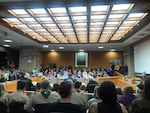The Salem City Council Monday night decided to amend an ordinance that would have restricted people from sitting or lying on the city’s public sidewalks for most of the day.
The proposed ordinance originally consisted of the “sit-lie” restriction, banning people from sitting or lying on public sidewalks from 7 a.m. to 9 p.m., and 24-hour bans on camping and leaving public property unattended on sidewalks.
The Council narrowly chose to take out the sit-lie portion, with a 5-4 vote, keeping the other two parts of the ordinance intact.
About 40 community members at the meeting said the ordinance unfairly targeted people experiencing homelessness.
“People don’t realize how humiliating and how embarrassing it is to be sleeping on the streets,” said Stanley Thornhill, a man experiencing homelessness who said he had been staying at the Marion County Work Center.
“It really bothers and hurts me to see that a group of people wants to put together something as senseless as this act to drive homeless people basically underground.”

Community members pack the room at a Salem City Council meeting Nov. 26, 2019.
Meerah Powell / OPB
The Council also decided to take out a portion of the ordinance that would have allowed law enforcement officers to give repeat offenders of the ordinance “exclusion orders,” effectively banning people from Salem’s “crime prevention zones” in downtown and north Salem, with potential for trespass charges and jail time if they did not comply.
A handful of people spoke out in support of the full ordinance — mostly people involved in the downtown business community and people who live near homeless camp sites.
The Salem Area Chamber of Commerce’s board of directors and public policy committee both unanimously supported the full ordinance.
“There is a clear understanding amongst the business community that this ordinance is not the magic bullet to solving the community’s homeless crisis, but it is a first step in addressing some of the issues that our downtown businesses largely are facing,” said Tom Hoffert, CEO of the Chamber of Commerce.
Related: Salem May Restrict People From Sitting Or Lying On Public Sidewalks
This is the second time the Salem City Council has declined to approve a sit-lie rule. The first was in 2017, when the Council instead created the Downtown Homeless Solutions Task Force, a group that developed recommendations to address houselessness, including providing more public restrooms and expanded laundry and shower facilities.
Most of those recommendations are still in the works and have yet to be implemented.
Salem Mayor Chuck Bennett defended the ordinance’s sit-lie rule, stating that Salem Police Chief Jerry Moore had specifically asked for it as a “tool” law enforcement could use.
“I’ve never ever heard this police chief, or previous police chiefs, coming to us asking for tools they didn’t need. I just have not heard it,” Bennett said.
The mayor argued that the sit-lie rule has more to do with solving “behavioral issues” rather than addressing homelessness as a whole.
“This is about people in the homeless community behaving badly,” he said, “and interfering with the normal activity in our residential business district downtown.”
“This will displace folks, it will not make them disappear,” Councilor Vanessa Nordyke said of the sit-lie rule.
Nordyke, an attorney, also questioned the legality of the rule — citing potential hefty litigation fees the city could face.
“I question whether it’s a good use of our resources to have the city back on its heels defending the constitutionality of a provision that many deem inhumane,” she said, “instead of spending our limited time and resources on addressing homelessness, on reducing homelessness.”
Some of the Salem councilors spoke on their own personal experiences with topics touching on mental health and homelessness.
Related: Cut To Oregon State Hospital Wait Times Leaves Some Without Mental Health Care
Councilor Chris Hoy spoke about how his mother was a patient at the Oregon State Hospital.
“I’m a person who comes from a family with a history of mental illness,” Hoy said.
He called the sit-lie portion of the ordinance “the least understood” and said it had “the appearance of having the least compassion.”
Councilor Jackie Leung tearfully spoke about how she lived in a Salem shelter after getting out of an unsafe relationship.
“I did not choose to be there, but I wanted to be there because it was safer than being at home,” Leung said. “Think about all of the folks who are living on the streets, how many of them want to be in a shelter but can’t get into a shelter.
“I’m bringing this up as a reminder to people of who we have living on the streets,” she continued. “I just want people to think about these things when you’re making your vote and how it will affect these folks, when they’re already living traumatized and scared.”
A group of audience members clapped in support of Leung to which Bennett responded, “Are you ready to vote, or would you like to hear some more clapping? What would you like to do?”
The amended ordinance received an 8-1 vote, with Councilor Jim Lewis voting no.
On the amended motion, Bennett said, “It’s better than nothing. It’s close to, but better than nothing.”
The City Council is expected to hold a second vote on the amended ordinance in December for it to become official.

